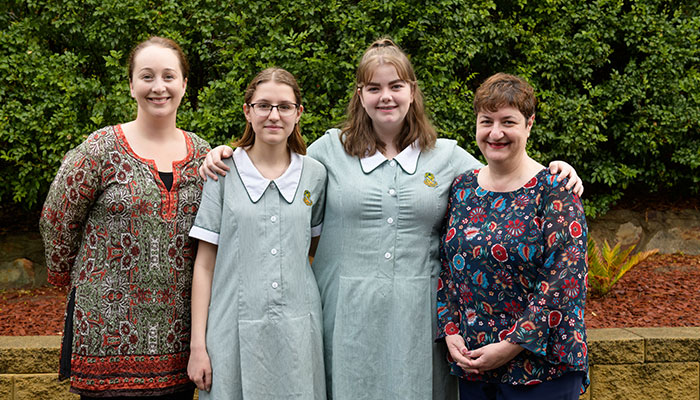Melissa Wurramarrba plans to become the first Aboriginal teacher from her community in more than 30 years. She and Ernest Daniels – who started at Macquarie University in 2017 – were the trailblazers for the establishment of the Wuyagiba Study Hub pathway to Macquarie University and helped conceptualise the Study Hub to ease the transition to university for other Arnhem Land students.
For Trudy Hall, the dream is nursing; Norissa Manimarrlu wants to work in banking, while Zac Rogers is keen to be an engineer. These were among the first graduates of the Wuyagiba Study Hub in Arnhem Land 2018 who completed their training last year – and some are now in Sydney, continuing their undergraduate studies at Macquarie University’s main campus.
This year, a further 20 Aboriginal students are now going through their 'bush semester', the second group to attend the cross-cultural and specially-designed intensive 10-week university preparation classes at Wuyagiba – Macquarie’s ‘Bush University’.
Former school principal Kevin Guyurruyurru Rogers, a respected Ngukurr Elder, leads many of the classes in a curriculum designed for ‘two-way learning'. Cultural knowledge and language is taught by local Elders and then Macquarie University academics work with students to use the cultural material to learn academic skills like essay writing and research.
In Arnhem Land, population 16,000+, there are hundreds of teachers, doctors, nurses, mechanics, accountants, child care workers, admin officers, police officers – all the professions needed by most communities.
The community want to regain control of their land, they want to be able to run their own schools, the clinic, the shop, the pool, the hotel – it’s all owned by whitefellas up here.
But here, where about 93 per cent of residents are Aboriginal, a huge proportion of professional roles are held by a white visitor, either on a fly-in, fly-out basis or as temporary residents who move into communities for a short time.
When visitors hold most of the important job roles, not only is there an economic loss to the community, young locals also don’t see a potential career path and aren’t motivated to complete Western education.
There’s also frequent cultural misunderstandings with those outside the culture.
“All the teachers at Ngukurr school are not Aboriginal, and they don’t know Kriol (community language) or our culture,” says Melissa Wurramarrba.
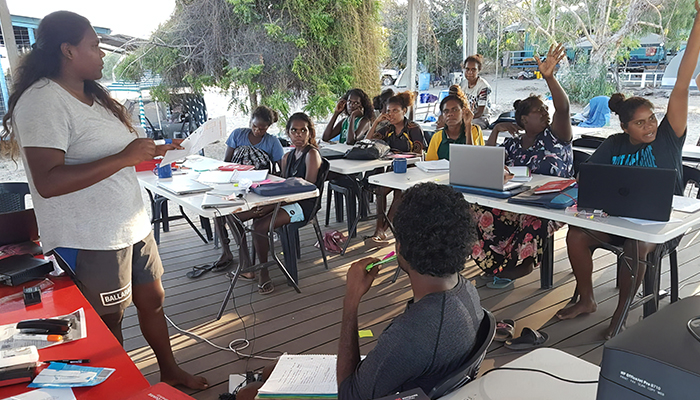
Life lesson: Melissa Wurramarrba, pictured far left, wants to become the first Aboriginal teacher from her community in more than three decades.
“This can create problems with students understanding, and with teachers doing or saying culturally wrong things.”
For Melissa, one of the biggest challenges was having her ‘poison cousin’ in the same tiny Year 11 and 12 class – a person she was obligated by culture not to speak to, or even be in the same room with.
Restoring control to communities
Dr Emilie Ens is an ecologist at Macquarie University who visits Arnhem Land to carry out scientific research for several months each year. For the past decade, she’s worked closely with local communities and together they have discovered new species, found new populations of threatened species and worked to exchange traditional knowledge and science, to the benefit of both.
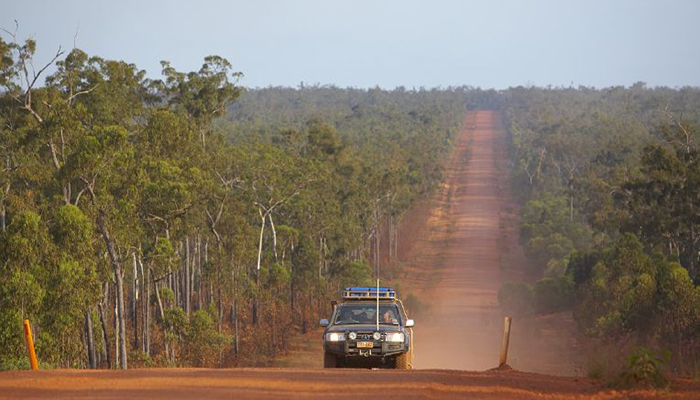
Remote region: Arnhem Land is a vast wilderness area in the north-east corner of Australia’s Northern Territory, Photo: Flickr/Ewen Bell.
“The community want to regain control of their land, they want to be able to run their own schools, the clinic, the shop, the pool, the hotel – it’s all owned by whitefellas up here,” says Ens.
To get locals to hold these well-paid and important leadership roles in communities though, there's a big obstacle: getting a university qualification means leaving home – where English is often their second or third language – and moving to a big city.
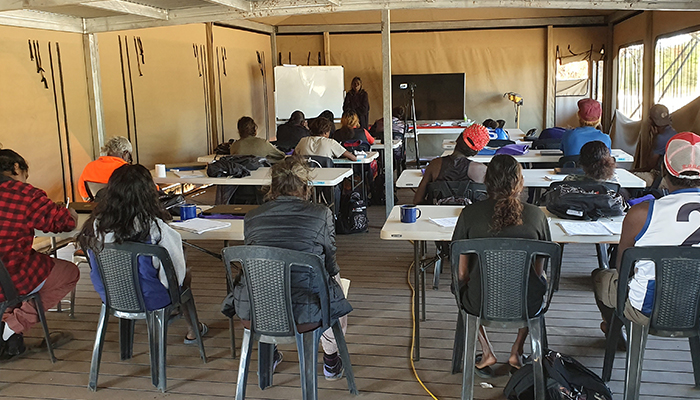
Heads down: Dr Ens says the intense focus in the course is helping to raise literacy levels.
“The locals need the skills, they want the Western education and they want to learn the organisational and financial skills, the technology and the communication skills, so that they can take on these jobs and serve their community,” says Ens.
From the 1960s, decades of hard work by passionate activists in Aboriginal communities led to an era of self-determination, ushering in land rights and return to homelands, but government policies since the 1990s have caused slow attrition of some of these gains, she says.
- New map reveals fastest growing languages across Sydney
- Future teachers learning valuable lessons from India teaching experience
Before Melissa Wurramarrba went to uni, none of the kids attending school in the tiny communities of Ngukurr and Numbulwar had gone on to university – not since Wuyagiba Study Hub leaders Kevin Guyurryurru Rogers, Mrs C. W. Daniels and others from Ngukurr graduated with teaching degrees from Deakin University in the 1980s.
Things are getting better; Australian Bureau of Statistics census data showed that around 3.9 per cent of Indigenous Australians aged 15-24 attended tertiary education in 2016, a good increase from the 2.6 per cent attending in 2011.
A passion project for many
The remote university outpost of Wuyagiba in Arnhem Land is the result of fundraising and partnerships driven by community leaders with the passionate support of Ens. The Wuyagiba Bush Hub Aboriginal Corporation, run by a local board of directors from the nearby towns of Ngukurr and Numbulwar, was set up to run the bush uni.
Crowdfunding and ongoing support from the Nature Conservancy helped kick the project off but most of the funding has come from Macquarie University and the Australian Government's Regional Study Hub program.
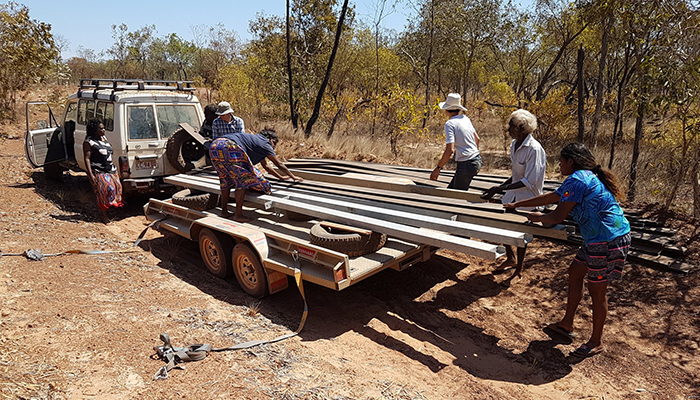
All together: Community members built most of the bush uni structures in a matter of weeks.
The site comprises a semi-open outdoor learning space complete with desks, technology and teaching materials. Off to one side the Regional Study Hub program has allowed for a big camp kitchen and student and staff accommodation, all set amongst a 1970s-style remote Northern Territory outstation on the west coast of Gulf of Carpentaria.
The whole camp runs off pre-existing solar panels and a new NBN connection helps students link to Macquarie University’s online learning systems.
The materials were transported thousands of kilometres and community members put together most of the structures in a matter of weeks to meet tight deadlines.
The support from community members and families has been overwhelming, Dr Ens says; the 20 or so students here now are supported by another 30 family members and local staff.
We’ve been able to bridge some of the structures and systems that can be real barriers to learning when you’ve never worked in a space anything like university.
Being away from the everyday interruptions of community life on a site in the remote Gulf country, two hours drive from the nearest community, allows students to focus on their work.
Ens says that students are learning good study habits, getting to bed early and focusing their brains on learning, and the intense focus in the course is helping to raise literacy levels.
However the remoteness adds logistical challenges to the whole operation. A cyclone in early 2019 caused delays in grading the road and transporting materials. All food needs to be driven in by 4WDs from the delivery point at Ngukurr, two hours away.
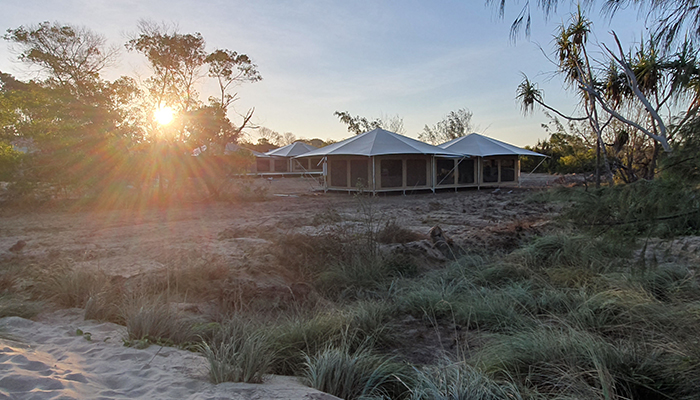
On country classes: Indigenous students learn practical academic skills during their 'bush semester' at Wuyagiba.
Dr Leanne Holt is the Pro Vice-Chancellor, Indigenous Strategy at Macquarie and says that the first group of students from the Wuyagiba pilot program, held last year, have transitioned to a bespoke Bachelor of Arts program at Macquarie.
“There are more than 10 students doing the same subjects for their first year and so we’ve been able to bridge some of the structures and systems that can be real barriers to learning when you’ve never worked in a space anything like university, and particularly when English is a second language,” she says.
Once the first year is completed, students who are doing well can choose to move into their preferred area, such as teaching, nursing or business, Holt says.
“It’s been a big change for them but they are very motivated and their communities really want them to succeed and come back to help their communities become more self-sufficient.”
Dr Leanne Holt is the Pro Vice-Chancellor of Indigenous Strategy at Macquarie University. Dr Emilie Ens is a Senior Lecturer in the Department of Environmental Sciences.


